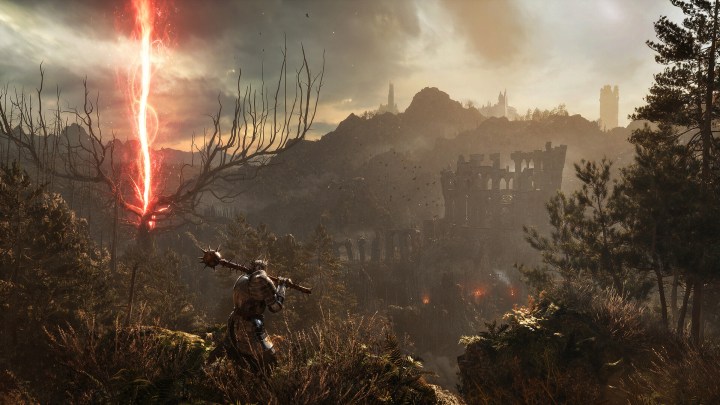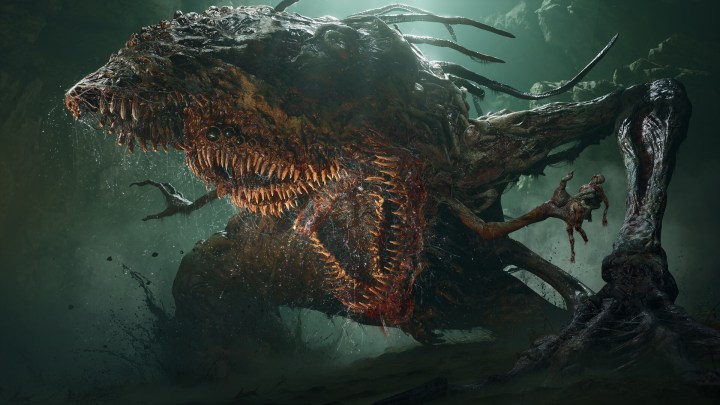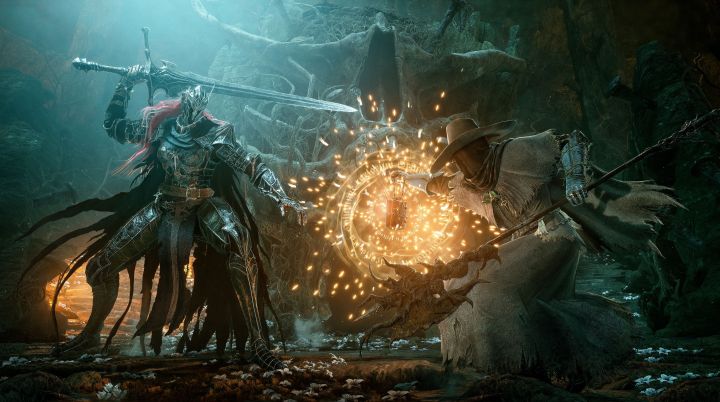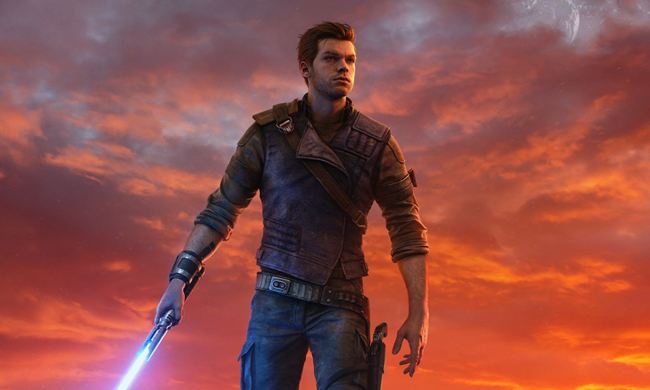After watching an impressive 30-minute demo of Lords of the Fallen, I had no shortage of questions to ask the game’s creative director, Cezar Virtosu. Over the next half-hour, we’d discuss a wide range of the action-RPG’s new features, from its faster combat to its unique bonfire-crafting twist. The key moment of the interview, however, would come when we discussed its most distinct feature: the Umbral world. In between normal Soulslike battles and exploration, players can press the left trigger to shine a lantern and reveal secret paths all around the grimdark world. There’s essentially a whole second world underneath the main one, filled with horror visuals and traversal puzzles.
Virtosu goes into detail describing that idea, laying out a scenario where a player might uncover a tendril with their lantern and follow that into a complex series of navigational decisions. “You feel like the John Wick of Soulslikes,” Virtosu excitedly says. “Once you get into this, you’re going to feel fearless, like an apex predator.”
Though he was describing that specific Umbral concept, the phrase “John Wick of Soulslikes” stuck with me the more I thought about what developer Hexworks is creating here. The demo I saw at this year’s Game Developers Conference highlights a faster-paced Soulslike that gives players a ton of tools to work with. It still looks like the incredibly challenging game that genre purists crave, but those patient enough to master its various systems can turn themselves into a tornado of violence. That makes Lords of the Fallen a strong Soulslike to watch in a post-Elden Ring world.
Rebooting the series
If you’ve been following the game since its announcement, you may have noticed a subtle change already. The title is no longer The Lords of the Fallen; it’s just Lords of the Fallen, like its 2014 predecessor. That’s a very intentional change, as Virtosu stresses how much this version is a full reboot of the original rather than a continuation of it (he jokes about how goofy a title like Lords of the Fallen: Origins would have been). That approach is bringing some major changes, both in terms of gameplay and how the team is approaching its narrative.
“We all dream of the anime Netflix adaptation at some point,” Virtosu tells Digital Trends. “We wanted to make the world very compelling. We wanted new characters that carried gravitas. And we wanted to move away from high fantasy to dark, Berzerk-like grit. And you see there are ambassadors of evil, but you must ask yourself: who are these people? Why am I fighting them? Am I becoming them?”

That tonal shift is pretty apparent from the get-go. I’d see a much darker world compared to the original game during my demo session, filled with eerier environments and grotesque bosses that dip more into supernatural body horror. One boss battle has me fighting what seems like a normal human in phase one, but phase two has it retching around on four twisted limbs that I can hack away at. That change can especially be seen in the aforementioned Umbral world, where the imagery is at its most unsettling. There, I’d see a hidden layer of snake-like tendrils and menacing stone bodies hiding in plain sight.
Virtosu is confident with that change in direction, especially considering that the game is launching in Elden Ring’s enormous shadow. In addition to its unique genre twists, he feels that the laser-focused art direction makes the game stand out in a crowded genre.
“The texture of the game puts us in a very cozy place,” Virtosu says. “We’re a game that’s more about detective work, very hard combat, a lot of horror, and seamless multiplayer. And our grimdark fantasy is tangible; you can lean against it. Usually, these games bring too many elements. At a point, you’re like, ‘I don’t know what this is about.’ We stripped all those elements and wanted that dark, gothic feel like Bloodborne.”
Semi-open world
Structurally, Lords of the Fallen takes a “semi-open world” approach. I’d see a sizable swath of Axiom during my session, with the person in charge of the demo flying the camera through dark catacombs, over grim swamps, up the side of a mountain, and into a castle-like structure where no two rooms looked the same (Virtosu notes that there’s very little asset copy and pasting, with each room holding its own environmental story). Considering there’s a whole secret world beneath that, it all looks pretty enormous at first glance — not to mention gorgeous and meticulously detailed thanks to Unreal Engine 5.

After completing a sort of tutorial level, the game opens up into a wider world that’s broken into explorable chunks. There are five specific “dungeons” marked on the map with a red beacon, and players can technically chase them in any order. There’s a major boss at the end of each, though the world is dotted with tons of massive fights, both required and optional. Virtosu does say that there’s an optimal order, though, comparing its structure to Demon’s Souls.
In addition to that setup, Lords of the Fallen brings a few intriguing twists to standard Souls traversals. The first has to do with its version of bonfires, the safe points where players can level up and heal. Those sites are fewer and farther between in this game, but for good reason: players can craft their own. By collecting rare resources, players can build a bonfire anywhere they want on the map, though there’s a major risk/reward component that comes with that. Build it in the middle of an enemy patrol zone and you’ll risk it getting destroyed, wasting those resources. Find a safe spot for it, though, and you’ll have more control over when and where you can let your guard down.
The game is incredibly challenging — it’s much more challenging than the first game.
The other aspect that piques my interest is the game’s almost Sekiro-like second life system. When players die, they don’t simply lose everything they’re holding, forcing them to do a standard corpse run. Instead, they get sent to the more dangerous Umbral world. If they can escape from it successfully, they’ll keep all their resources and continue on — otherwise, they’ll drop it all. That changes up the normal risk/reward flow of the Souls genre, as Virtosu says that the team didn’t want players to feel like they were simply restarting every time they died.
The more I see and the more Virtosu talks about the ideas guiding the project, the more it’s clear how Lords of the Fallen is carving its own path forward in a genre that’s been done to death. It’s when we drill into the small nuances of combat, though, where I finally come back to that offhand John Wick comparison.
A fluid Soulslike
With any Soulslike, finding the right difficulty level is always a challenge in itself. For the new version of Lords of the Fallen, the team wanted to keep the experience tough, but it would need to learn from its predecessor’s flaws to get the balance just right.
“The first game drew criticism for being very tough at the beginning, but then the RPG aspect made the encounters trivial,” Virtosu says. “This is one thing we took to heart. The difficulty was in a place that didn’t work long term. For this, we added a massively long tutorial. We added faster movement. We made it quicker to get out of animations. We added a second life. The game is incredibly challenging — it’s much more challenging than the first game … We throw a lot at the player, but we also give them the tools to mitigate difficulty. But we’re not telling them what to do; you have to discover it.”

It’s some of those specific changes to the combat that make Lords of the Fallen feel more fluid than the genre typically is (at one point, I joke that it’s practically a Batman Arkham game next to its peers). Many of those changes are incredibly subtle tweaks that only serious Souls fans might notice. Healing is faster. Weapons can be quickly switched mid-combo. Players can cancel out of some animations. Melee attacking is still slow and considered, but details like that make battles feel quicker and less punishing if you overcommit.
There’s a sizable layer of customization on top of that, which further deepens what players can pull off. For one, there are several character classes to choose from this time. Rather than telling a narrative about a specific main character, the team wanted to lean into more emergent storytelling guided by the player. There’s also a huge range of spells, and three can be equipped at once.
One specific moment of the demo stands out the most. At one point, the demo runner reached a cave entrance that was surrounded by something like six enemies. As you might imagine, they made mincemeat of him as he tried to slash them one at a time. After successfully escaping from Umbral and returning to that patch of enemies, he decided to break out some spells instead. A breath of flame would melt down one in front of him, while a hail of fiery meteors would destroy three in the back. In seconds, he’d completely decimated the guards without taking a scratch — a regular John Wick hero moment.

That’s what ultimately has me excited about Lords of the Fallen, even as someone who’s not easily won over by the genre. It’s a Soulslike that’ll reward players who make a plan and follow through with it, both in combat and exploration. The action is flexible enough that I imagine a skilled player will be able to fluidly chain together all its various nuances and leave behind a trail of ashes. Getting there will still be a major challenge, but it doesn’t seem hopeless. The right tools are all there, waiting for someone who knows how to use them.
Lords of the Fallen is set to launch this year on PlayStation 5, Xbox Series X/S, and PC.



